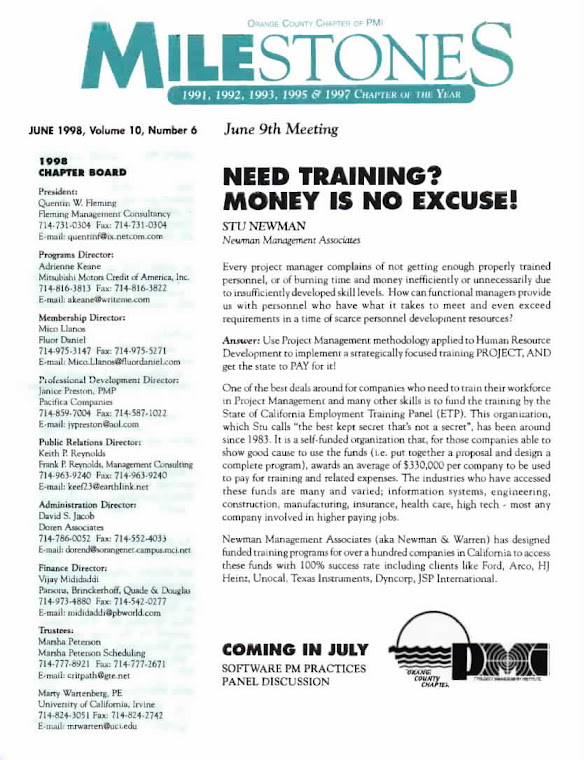The site, http://www.pmhub.net/
is a pretty good source for sample test questions, test taking advice and discussion.
One of the consistent themes in folks who post their LL there are:
1. Arrive early
2. Ask for calculator
3. Write down all the common forumlas you think you might need from memory first thing
4. When you encounter a very wordy question or one that obviously takes a lot of time, make a quick guess and mark to return, go on to the next question and come back.
5. Take practice tests.
6. Use memory aids for things you find hard to remember.
Stu
Saturday, June 21, 2008
Monday, June 9, 2008
Three steps to successful interviewing
Successful Interviewing:
There are three steps to successful interviewing. All of these steps are built upon the competencies and accountabilities of the results of the position you require. Write out what these are for the position you are intending to fill.
Step 1 The Screening Interview.
This is usually done by phone. Good screening focuses on four questions tightly focused on the job. Ask questions about these four areas:
The candidates career goals
What the candidate is really good at professionally
What the candidate is not interested in doing or not good at
Who the last five bosses were, what each boss would list as the candidate’s strengths and weaknesses, and what rating on a scale of 1 to 10 they would give
Step 2 The In-depth Interview
This is done face-to-face and usually takes one hour. What you are doing in this interview is searching for strengths and weaknesses and behaviors. Again, all questions are focused on what the candidate has done (past performance) and behaviors that are required for successful performance of the job duties and accountabilities.
Your questions delve into the person’s background in school, work history, career goals and competencies. Your questions are designed to find out what were the high and low points during the formative years in school. Then you should ask about each job the person has held. Questions to consider are:
What were you hired to do?
What were your accomplishments?
What failures or mistakes were made in this job, and what did you learn from them?
What talent did you inherit, what changes did you make to this talent mix, and what talent did you end up with?
What were the people like that you worked for, and how would they rate you?
Why did you leave?
Then delve into the career aspirations of the candidate and how this position would enhance these aspirations.
Finally, ask relevant questions about the required competencies you require for the position.
Don’t spend time “selling” the job at this stage. Once you have determined the candidate that best fits the position you “sell” the job based on the good fit for the position.
Step 3 Reference Checking
Reference checking is a short but professional conversation. What you wish to know can be found by these questions:
The situation or context they worked in with the candidate
The candidate’s strengths and weaknesses with examples
How they would rate the person’s overall performance in that job
Ask about a key specific that came out in the interview with the candidate that shows strengths or weaknesses.
(This article was written by Bern Lefson, SCORE Orange County Management Counselor)
There are three steps to successful interviewing. All of these steps are built upon the competencies and accountabilities of the results of the position you require. Write out what these are for the position you are intending to fill.
Step 1 The Screening Interview.
This is usually done by phone. Good screening focuses on four questions tightly focused on the job. Ask questions about these four areas:
The candidates career goals
What the candidate is really good at professionally
What the candidate is not interested in doing or not good at
Who the last five bosses were, what each boss would list as the candidate’s strengths and weaknesses, and what rating on a scale of 1 to 10 they would give
Step 2 The In-depth Interview
This is done face-to-face and usually takes one hour. What you are doing in this interview is searching for strengths and weaknesses and behaviors. Again, all questions are focused on what the candidate has done (past performance) and behaviors that are required for successful performance of the job duties and accountabilities.
Your questions delve into the person’s background in school, work history, career goals and competencies. Your questions are designed to find out what were the high and low points during the formative years in school. Then you should ask about each job the person has held. Questions to consider are:
What were you hired to do?
What were your accomplishments?
What failures or mistakes were made in this job, and what did you learn from them?
What talent did you inherit, what changes did you make to this talent mix, and what talent did you end up with?
What were the people like that you worked for, and how would they rate you?
Why did you leave?
Then delve into the career aspirations of the candidate and how this position would enhance these aspirations.
Finally, ask relevant questions about the required competencies you require for the position.
Don’t spend time “selling” the job at this stage. Once you have determined the candidate that best fits the position you “sell” the job based on the good fit for the position.
Step 3 Reference Checking
Reference checking is a short but professional conversation. What you wish to know can be found by these questions:
The situation or context they worked in with the candidate
The candidate’s strengths and weaknesses with examples
How they would rate the person’s overall performance in that job
Ask about a key specific that came out in the interview with the candidate that shows strengths or weaknesses.
(This article was written by Bern Lefson, SCORE Orange County Management Counselor)
Subscribe to:
Comments (Atom)



